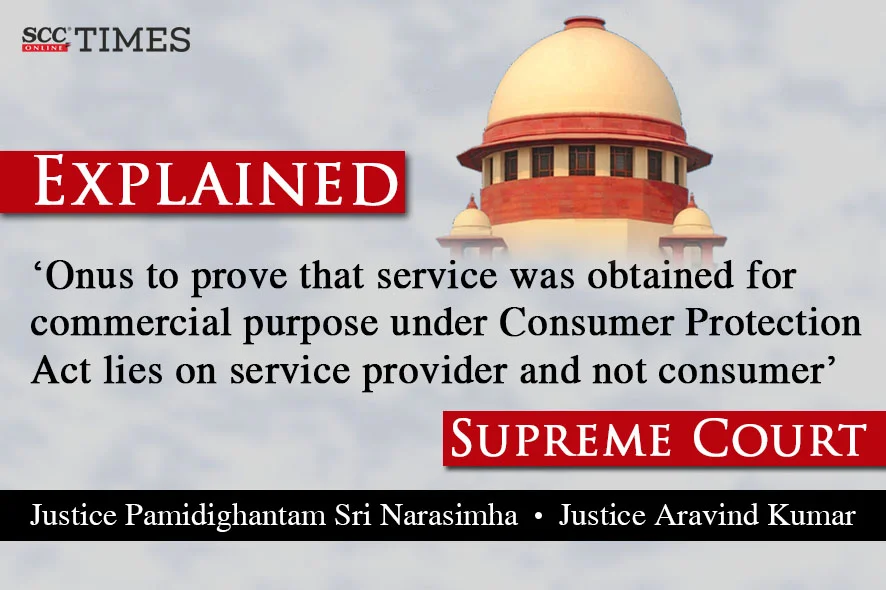Supreme Court: In a batch of civil appeals against the order of the National Consumer Disputes Redressal Commission, New Delhi (NCDRC) wherein the view taken by the State Forum and the District Forum, that there was ‘deficiency in service’ and ordered for refund of the claimed amount with interest of 18% p.a. was upheld, the Division Bench of Pamidighantam Sri Narasimha and Aravind Kumar*, JJ. dismissed the appeal and held that deficiency of service was proved.
The Court also held that the onus to prove that service was obtained for a commercial purpose under the Consumer Protection Act, 1986 lies with the service provider and not the consumer.
Background
The service provider is a registered chit fund company engaged in chit business. The complainant/ respondent had subscribed to certain chits and the subscription was made in the chit group for a chit value of Rs.1,00,000/- payable at the rate of Rs.2500/- per month for a period of 40 months. The complainant’s case was that the service provider had illegally stopped the chit business in the year 1996 and when the complainant requested the service provider to repay the chit amount deposited until stoppage of the business, it was refused stating that the complainant owed certain dues to it and therefore, it adjusted the subscription amount against pending dues of the complainant. The complainant filed cases before the Assistant Registrar of Co-operative Societies for recovery of adjusted amount, whereby the Assistant Registrar passed an award and directed the service provider to pay the amount to the complainant.
The appeals against the said order before the Additional Registrar of Co-operative Societies failed. The Additional Registrar directed the service provider to pay the award amount on the ground that said chit groups did not come under the Chit Funds Act, 1982. The High Court directed the complainant to approach the Consumer Forum and held that said cases were not maintainable under the Chit Funds Act. The District Forum instead of examining whether the service availed on behalf of the complainant was for a commercial purpose, it determined whether the complainant fell within the definition of a “person” as defined in Section 2(1)(m) of the Consumer Protection Act, 1986 (‘the Act’). On merits, it found that there was, in fact, ‘deficiency in service’ and ordered for refund of the claimed amount with interest of 18% p.a. The State Forum also upheld the District Forum’s view. The NCDRC also agreed with the State Forum and District Forum on the merits of the issue and found no reason to interfere with the District Forum’s order.
Analysis and Decision
Whether the service obtained by the complainant was for a commercial purpose, whether the complainant fell within the definition of consumer under Section 2 (1)(d) of the Act.
The Court perused Section 2(7) of the Act which defines ‘consumer’ and noted that the definition of ‘consumer’ had undergone textual amendments in 1993 and in 2002. The Court said that there are three parts to the definition of a consumer, firstly, the jurisdictional prerequisites for a person to qualify as a consumer have been set out, —there must be purchase of goods, for consideration. Secondly, there is an ‘exclusion clause’ [‘carve out’] which has the effect of excluding the person from the definition of a consumer and the said carve out applies if the person has obtained goods for the purpose of ‘resale’ or for a ‘commercial purpose’. Thirdly, there is an exception to the exclusion clause — which limits the scope of ‘commercial purpose’. The explanation provides that the expression, ‘commercial purpose’ does not include persons who bought goods ‘exclusively for the purpose of earning his livelihood, by means of self-employment’.
Regarding the onus of proof, the Court noted that for the first part, the onus lies on the complainant, for the second part which is invoked by the service providers to exclude the complainants from availing benefits under the Act, the onus of proving that the person falls within the carve out necessarily rests on the service provider and not the complainant. For the standard of proof, the Court explained that it has to be measured against a ‘preponderance of probabilities’. Further, the Court said that Leelavathi Kirtilal Medical Trust v. Unique Shanti
Developers (2020) 2 SCC 265 sets out the principles on which it must be determined whether the onus of proving ‘commercial purpose’ was properly discharged by the service provider, and if, the service provider discharges its onus of showing that the service was availed, in fact for a commercial purpose, does the onus shift back to the complainant to bring its case within the third part, i.e. the Explanation (a) to Section 2(7) — to show that the service was obtained exclusively for the purpose of earning its livelihood by means of self-employment.
The Court explained that to file a complaint, one must be a complainant and for one to be a complainant, he must be a consumer. If a person fails to come within the definition of a consumer, he cannot be a complainant under Section 2 (1) (b) of the Act and therefore, such person cannot file a complaint under the Act.
In the matter at hand, the Court noted that the service provider had raised a plea that the complainant did not satisfy the definition of consumer since the service was obtained for a commercial purpose. The Court said that the service provider had merely pleaded in its version that the service was obtained for a commercial purpose, no evidence led to probabilise its case other than merely restating its claim on affidavit and it is well settled that a plea without proof and proof without plea is no evidence in the eyes of law.
Hence, the Court dismissed the appeals and held that the three forums had concurred in their findings and that there was proved deficiency of service.
CASE DETAILS
|
Citation: Appellants : Respondents : |
Advocates who appeared in this case For the petitioner: For Respondents: |
CORAM :








